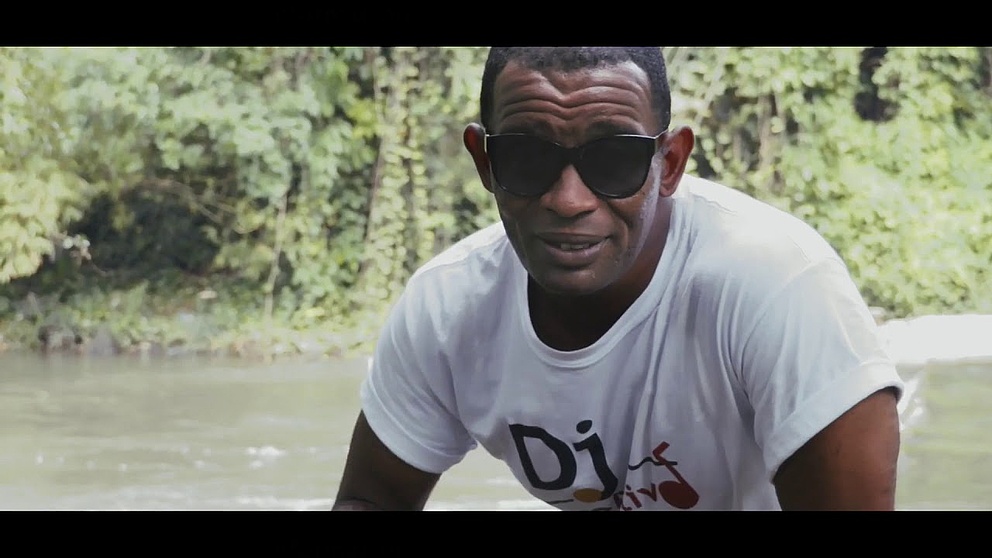Jump to the content
- {{#headlines}}
- {{title}} {{/headlines}}
Alexander von Humboldt wouldn't seem to be the obvious choice for a rapper. What's the story behind your song "Humboldt's Groove"?
RETROGOTT: Perhaps not obvious, but I often take my inspiration from history or the social sciences. "Humboldt's Groove" was prompted specifically by the Goethe Institute, which invited me to the hip hop festival Potaje Urbano in Cuba. That's where the idea came up of doing a song about Alexander von Humboldt. So I started learning about him, reading up on him – and I found a lot of things in common with the statements of my own lyrics in his critique of civilisation and his view of society.
How much did you know about Alexander von Humboldt before this?
Of course I knew him on a superficial, general knowledge level. But, having studied German language and literature, I was more familiar with Wilhelm von Humboldt. Though there are some interesting parallels between the brothers. Just as Wilhelm was interested in the unique characteristics of different languages, Alexander drew comparisons between the natural environment in South America, Europe and Russia. Both of them were always looking for the bigger picture and saw the world as a whole, of equal value – rather than glorifying the Western world as the cradle of civilisation. That impressed me a lot.
In what way?
With his critical distance to the colonial, Eurocentric way of thinking, he was really ahead of his time. And also with his anti-nationalist approach and a certain contempt for the aristocracy. Alexander von Humboldt is someone who is very easy to like from today's perspective.
How does your Cuban colleague El Temba, who you recorded the song together with, feel about Humboldt?
The song also talks about how Humboldt was pioneering in advocating South American independence and in his opposition to slavery, this was of course ample reason to like him. But Humboldt was also an early critic of the negative influences of humans on the environment, and he made his first observations about this in Cuba. He was already making the connection between environmental protection and economic activity. I think people in Cuba have a very strong awareness of this.
Temba's verse is sort of a free rendering into Spanish of my verse. So we engaged in a musical dialogue about Humboldt's ideas.
Was Humboldt an early leftist?
From today's point of view he's on the far left of the political spectrum. Humboldt would probably be considered a terrorist in today's USA! (Laughs.)
And he could probably be found among the ranks of the environmental activists...
Yes – as a scientist for future! At the same time, it was important to me not to travel to Cuba with the idealised image of a hero, implying: "Look what a brilliant scientist our part of the world has produced!" Humboldt was a critic of his origins and the privileges he had. Nevertheless, he was for instance dependent on the Spanish crown for his expeditions, and he was very aware of these conflicts.

In one of the lines, you rap: "When Humboldt stood in the Andes 200 years ago, he already understood that monoculturalism was doomed to fail." Is it frustrating that this is still not universally acknowledged today?
Very much so. I think even Humboldt was frustrated that his words fell on deaf ears. In the scientific discourse of his time, many of his views were considered excessive. Nationalism and certain forms of cultural romanticism are currently on the rise again, and this quickly turns into prejudice, even though we actually know that we live in a globalised world. By "monoculturalism", or "monoculture", I am referring to both the ecology as well as the social dimension. It is a proven fact that only mixtures exist in both domains.
Another line says: "Humboldt's greatest discovery: that which speaks to our sensibility cannot be measured". What does this sentence mean for you?
It's a quotation from Humboldt's journal that acts as a hook for the song. It's taken from Andrea Wulf's biography of Humboldt. Humboldt was fascinated by nature and wrote this sentence in the South American rainforest as he looked with wonder at the night sky. The fact that, as a scientist, Humboldt was aware of the limits to knowledge and permits this level of human feeling or sentiment subverts the positivist scientific discourse of his time.
Perhaps this was because of his friendship with Goethe?
Most definitely – Goethe was similarly interested in both scientific and aesthetic matters. There's a certain irony in the fact that someone known for his measurements, surveys and statistics admits himself that what really matters cannot be empirically determined. Here we have metaphysics creeping in and opening the door to art, I liked that.
Is this the essence of the "Humboldt groove" of the song title?
Yes, this is where it becomes clear that in addition to cool calculation, there are other paths to knowledge as well, that even in science there is an aesthetic component. Humboldt was someone who not only believed in progress, but also warned of its consequences. He saw the bigger picture, but was also aware of the impossibility of grasping it completely. This humility impressed me a lot. And that, for me, is the groove.


